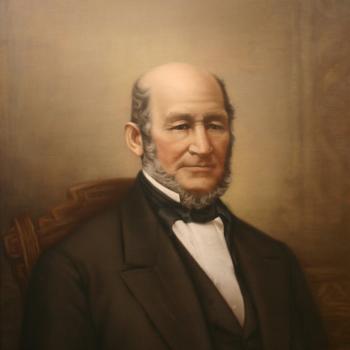
(Wikimedia Commons public domain image)
***
I’ve seen little or nothing of the Real Housewives franchise. But, based upon the far-too-much that I’ve read about it, I’m certainly not a fan, not least because it glamorizes crassness, shallowness, and lack of charity. That said, the newest expansion of the empire, The Real House Wives of Capitol Hill, seems to me to be, by many light years, the most repulsive of the lot. Marge and Lauren make me want to defend Ilhan, Rashida, and Alexandria — and, given that I’m a life-long free-market conservative, that’s definitely nowhere that I want to be. How long will this bigoted clown show run?
I’ll admit, though, that I like the recent addition to the show of the new character, Nancy, and that I very much like the new Secret Jewish Space Laser Corps Enamel Pin. (But will Kevin ever actually show up? Long-time fans of the old Republican Party are hoping for at least a cameo appearance.)
***
A critic who comments on this blog under various permutations of the pseudonym of Tavares Standfield became all-caps hysterical, multiple times, about my going to Egypt, declaring me irresponsible and predicting mass casualties and devastation upon my eventual return.
And clearly, he was right. Roughly two weeks ago, my wife and I passed through the Minneapolis/St. Paul airport en route to Cairo, and it’s just now been reported that the omicron coronavirus variant has appeared in Minnesota. Can this be coincidence?
In other but perhaps related news: I underwent a COVID test just prior to leaving for Egypt two weeks back, and the results were negative. I was again tested for COVID in Cairo, just prior to flying back to the United States. The test results came back negative. And then, because I came down with a case of the sniffles and sneezing on my last two days in Cairo — I suspect that it originated in an allergic reaction to really dusty and polluted air in the metropolitan area there (as bad as I’ve ever seen it) — I opted to take an at-home COVID test last night. And the results came back negative. That’s three negative COVID tests in roughly two weeks, which suggests that I may perhaps not have COVID.
Which makes my injection of the omicron variant of the coronavirus into Minnesota all the more astounding . . . and makes Tavares Standfield’s prophetic ability all the more impressive.
***
There are many observers who think — and many who hope — that Dobbs v. Jackson, the case out of Mississippi that is currently before the Supreme Court of the United States, will result in the overturning of the 7-2 SCOTUS decision in Roe v. Wade, which opened the floodgates of abortion in 1973.
I’m one of those who hope for the overthrow of Roe v. Wade — and the SCOTUS hearing yesterday (I listened to the entire thing) makes me cautiously optimistic that Roe’s time is just about up.
I was struck, at several points in yesterday’s back-and-forth, by how little either the justices or the pro-abortion advocates had to say in defense of Roe as a judicial decision, and by how frequently the conversation turned, quite irrelevantly in my judgment, to discussions of the alleged merits of widely-accessible abortion. But this strikes me as the kind of debate that belongs in legislatures, not in courts. I think it was Justice Kavanaugh who suggested that, as the Constitution is neutral on abortion, so ought the Supreme Court to be neutral — leaving the question to the various states.
For those who are interested in reading further on this topic, National Review has been offering excellent background regarding the two prior cases of Roe v. Wade and Casey v. Planned Parenthood, and really helpful analysis of Dobbs v. Jackson and the SCOTUS hearings. Among its articles is this one, which I’ve recommended here before and which I think everybody ought to read:
By the way, the only thing that seriously tempted me to vote for the person who occupied the White House just before Joe Biden was the question of the Supreme Court — both for reasons connected with Roe v. Wade and for reasons beyond. I’m very pleased that Justices Neil Gorsuch, Brett Kavanaugh, and Amy Coney Barrett are there on the bench right now.
Permit me to head off certain responses, here and, more likely, elsewhere: Yes, I am, on the whole, opposed to abortion. Not in all cases — I think that exceptions should be legally available in cases of rape, incest, severe fetal malformation, and threats to the life of the mother — but in most. However, my opposition to Roe v. Wade is not only predicated upon my dislike of abortion. It has to do, very much, with Roe’s character as an act of legislation, of fiat ex nihilo creation (by seven unelected judges) of a “right” unknown to the Constitution, with its nature as an exercise of raw judicial power, ignoring and bypassing the voices of the people and of the fifty states.
Overturning Roe v. Wade will not make abortion illegal. It will merely send the question of abortion back to the voters and to the individual states. Which is where it belongs.
Justice Sotomayor declared it a “religious” position to hold that fetuses are persons. That’s flatly false. I’m quite aware of thorough-going secularists who oppose abortion. One of them, for example, is a prominent writer for National Review. (See “The Secular Case against Abortion,” by Charles C. W. Cooke.) But to deny that a fetus is a person is just as much (or just as little) a religious position. In the end, personhood isn’t entirely a scientific question (if it’s even a scientific question at all), and it can’t really be determined by chemical analysis or physiological data. Nor should it be determined by justices of the Supreme Court, who have no special insight, expertise, or authority on the topic.
So who should decide it? Pending a direct, definitive, unambiguous, and universally-acknowledged declaration from God on the matter, I can think of no better way of arriving at an answer than by submitting it to the people generally, whether directly or through their elected representatives. That’s where the debate should occur. There’s a reason why the Constitution of the United States of American begins with the words We the People of the United States, speaking in their name, and why the first branch of the federal government that the Constitution describes (in Article I) is the legislative branch. It comes first. It is primary. That’s where earthly political authority ultimately resides in the United States.












